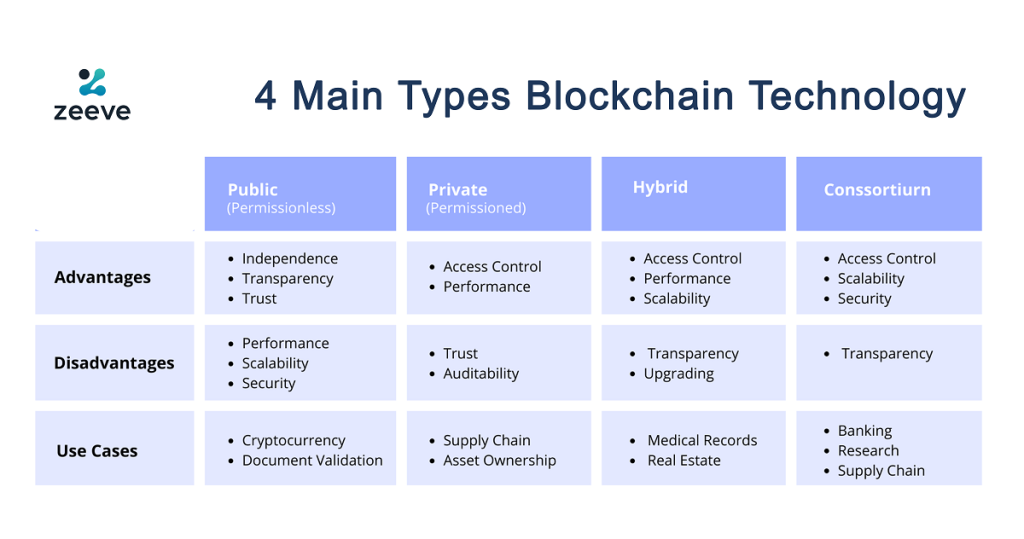The blockchain has been a revolutionary technology- transforming the world through its innovative features. This revolutionary technology has made it possible for business enterprises, governments, big corporate houses to streamline their processes, manage workflow more effectively and also enhance their productivity and performance with better solutions. It is now altering how we store, access, and use data. It also affects other facets of technology, such as how networks are trusted. Since blockchain adoption is still at its nascent stages, most of the enthusiasts are mostly aware of the public and private blockchain protocols but have limited information on the third type – hybrid blockchain protocols. In this blog article, we would cover all about the hybrid blockchains, their benefits, comparison of hybrid vs private blockchain, public, private and hybrid blockchain differences, interoperable hybrid blockchain, problem with hybrid blockchain models and also the use cases for them.
Introduction to Hybrid Blockchain:
Hybrid blockchain is often referred to as a combination of both public blockchain and private blockchain. It blends essential components of both public blockchain and private blockchain and with the mix of the best of both public and private blockchain protocols, it makes transactions and data private. But they can still be verified as necessary, for example by granting access via a smart contract. Although retained inside the network, private information can still be verified.
The hybrid blockchain owned by a private entity cannot modify the transactions. Hybrid blockchains are great for enabling companies to create their own permissioning-based networks alongside publically accessible ones. Any people who join such hybrid blockchains have complete network access.
Individuals joining the hybrid blockchain can enjoy full access to the network. However, the identity of the individual is secured unless they engage in transactions with the other users. Only then the other party is made aware of their identity.
Structure of hybrid blockchain is completely customizable, just like traditional blockchain. Members of hybrid blockchain can select which transactions are made public and who are authorized to access the blockchain. By combining the best aspects of both approaches, a business may collaborate with its stakeholders in the most effective way.
How does Hybrid Blockchain work?
Using blockchains that integrate two separate interfaces, a hybrid blockchain alternative is accessible to the public. This hybrid blockchain combines public blockchain transactions with individually managed private blockchain ledger files.
- Data Security: The public blockchain has certain limitations with respective data security. However, hybrid blockchain uses the private blockchain feature and makes sure that the data stays safe in its actual form. Data is being safely stored in the nodes and the transactions are being unaltered.
- Decentralized Access: The hybrid blockchain provides decentralized access to its participants. This feature provides scope to when and where the decentralization can be utilized as compared to both public and private blockchain.
- Transparent Handling of transactions: In comparison to some of the best private blockchains, the transparency feature in the hybrid blockchain is much better. As in private blockchain, there is limited access to user’s hence hybrid blockchain performs better in this respect.
To understand the role of iot and blockchain in integration of hybrid systems, it is also important to understand the functioning of the hybrid blockchains by users.
Once a user has been granted access to the hybrid blockchain platform, he or she can take part in all of its operations. He has the same privileges as you have to perform transactions, examine transactions, and even add or change transactions. However, users can stay rest assured that their identity will always be safely guarded and not made public. The user’s privacy is safeguarded in this way.
Only the user with whom a user is interacting learns the other users identify throughout a transaction. Performing the KYC (Know Your Customer) is one of the ways in which the businesses and organizations make the aforementioned identification procedure work effectively.
Public vs private vs hybrid blockchain
There are four types of Blockchain Networks-
- Public Blockchain
- Private Blockchain
- Hybrid Blockchain
- Consortium Blockchain
Public Blockchain: Public blockchains are open to anyone who wants to participate, whereas private blockchains are closed and controlled by a select few. Proponents of public blockchains argue that this openness is beneficial because it allows for greater transparency and accountability than is possible with private blockchains. Critics argue that this openness can also lead to fragmentation and lack of interoperability, as different networks built on different public blockchain protocols compete with each other. The most prominent public blockchain is the Bitcoin blockchain, which was created in 2009 by Satoshi Nakamoto. Decentralized and permissionless, everyone on the network is a participant.
Private Blockchain: Public blockchains are those that are open to anyone who wishes to join, and they allow for more democratic participation than private blockchains. They can be used to create a tamper-proof record of transactions, which is valuable in industries such as finance and healthcare. Public blockchains are also faster and cheaper to operate than private ones, making them preferable for large-scale applications.
Hybrid Blockchain: This blockchain is controlled by a single corporation, it is the combination of public-private and public-permissioned blockchains, allowing organizations to build private, permission-based systems in parallel with public, permissionless systems. An example of combining a public-private blockchain is IBM hybrid blockchain or the IBM Food Trust.
Consortium Blockchain: This blockchain is also known as the federated blockchain, it is a permissioned blockchain governed by a group of companies. Much on the same lines as the hybrid blockchain, consortium blockchain has the best of both the public and private blockchain functions.

Special feature of Hybrid blockchains: Public Anonymity
The hybrid blockchain method maintains the user’s anonymity even for people within its own network. No one except participants in the network will know that this is the anonymous user. This brings us to a fascinating point when the public and private systems collide.
The hybrid blockchain, also known as a bridle network, shares most of the essential characteristics of a public blockchain such as security and transparency, but places restrictions on who can view or edit transactions. Additionally, the hybrid network prevents the occurrence of black markets by limiting access to its users. As a result, hybrid blockchain, which makes use of both features, encourages greater security.
Benefits of Hybrid Blockchain:
Hybrid blockchain technology aims to make the technology more resilient and interoperable. It is further aimed at creating an open platform that can be used by different types of organizations and allows for the easy integration of new features and functionality. By doing so, it should make it easier for businesses to adopt blockchain technology and create a more efficient and secure system overall.
- Flexible Infrastructure Settings: The flexibility in terms of infrastructure services is the one of the biggest benefits the hybrid blockchain provides. As the other blockchain provides a strict blockchain infrastructure, rather a flexible approach for adjusting the ledger to one’s and the organization’s demands is provided by hybrid blockchain. We can always alter the level of decentralization, security and transparency required in the blockchain.
- Reduces Transaction Costs: Because it can be challenging to successfully complete verification in a private or public blockchain, powerful nodes inside the network may be able to exert some sort of influence over the decision-makers responsible for this process, increasing transparency. This helps in reduction of transaction costs and the fees for transactions might be as low as $0.01 per transaction.
- Defending Against a 51% Attack: Hackers’ lack of access to the network protects hybrid blockchain from 51 attacks.
- High Speed Operations: The hybrid blockchain offers high speed operations as compared to the public blockchain and is easier to handle as compared to the private blockchains.
- Protecting Privacy from the Outer world: Even for privacy-related problems, private blockchain is ideal. However, their ability to communicate with the outside world is constrained. Even though the objective behind integrating the blockchain protocols for businesses is to keep their sensitive information secure, they would also need to ensure that they integrate systems that allow for smooth communication with all their shareholders.
Examples of Hybrid blockchains
South Korean startup Blocko, backed by Samsung, announced the launch of Aergo Enterprise- Samsung hybrid blockchain system. Developers of the company have passed on their migration services to other clients of Blocko by using their private blockchain product.
Aergo Enterprise is developing more layers of internal and external security, scalability, and performance, and its hybrid approach is facilitating the exchange of assets like information, virtual items, and supply chain registries between blockchains, using Merkle Bridges.
Swisscoin is a new kind of cryptocurrency that uses a hybrid blockchain. This means that it is based on the blockchain technology but also uses its own unique system for transactions. Swisscoin has already achieved a lot of success since its launch in May 2017, and it is expected to continue growing in popularity.
Hybrid blockchain Use Cases:
For Ramco Systems to manage supply chain logistics, one of the top hybrid blockchain platforms – XinFin hybrid blockchain, has created a special network. XinFin launched its initial coin offering (ICO) early this year and since then has constructed its public-private blockchain using Quorum and Ethereum (public blockchain) (private blockchain). The high speed feature unique to the private blockchains combined with the enterprise-grade security of public blockchains is only one of the many advantages of employing a hybrid blockchain. The public blockchain can be leveraged well enough to validate the hash of transactions as created on the private blockchain.
The Ripple network and the XRP token are yet another practical application of hybrid blockchains. Ripple’s centralized nodes, which have the ability to arbitrate transactions in the event of a dispute, have frequently drawn criticism. However, the network can be made far more safe for its users by introducing a public blockchain to confirm the functioning of its private blockchain.
Below are the few applications of Hybrid Blockchain:
- Hybrid IoT: The Internet of Things can be managed effectively by using the hybrid blockchain, whereas using the public blockchain solution makes it very volatile for the hackers. The devices can be put in a private network with hybrid blockchain and only those who need them can access them. Depending on the data to share, certain network features can be made public. Many security challenges can be resolved with a hybrid strategy.
- Banking: A hybrid blockchain could be the great choice for finance. Banks may employ this strategy because they must secure user information while resolving issues internally. Even Ripple, a more specialized centralized cryptocurrency, has the flexibility to switch to a hybrid block chain network if necessary.
- Global Finance and Trade: The hybrid block chain has its applications in the field of finance as well. The XinFin uses the hybrid block chain with Quorum for the private part and Ethereum for the public part. Their goal is to offer a hybrid technology-based platform for international trade and finance.
- Supply Chains: The hybrid blockchain has enormous potential for use in supply networks. They must go hybrid because of how extensive the supply chain is and hence Blockchain cannot be either private or public. Numerous supply chain logistics firms have already begun using it. The IBM food trust is a prominent example of how a hybrid blockchain is being used in the supply chain. They want to make the entire food supply chain more efficient. Everyone participates in this network, including farmers, wholesalers, distributors, and others. Walmart participates actively in this effort as well.
- Government: The blockchain technology is evolving even in the Government sector. Blockchain can be used by the government to conduct voting, build public identity databases, store complex data, automate acquisitions, deliver social and humanitarian aid, and more. All of these need the use of hybrid blockchains. It offers public access while giving the government the necessary control. Fully private or publicly accessible blockchains are ineffective because they either restrict user access or reveal too much information. The proper governance over the blockchain can guarantee that the government maintains control while using the technology.
- Enterprise Services: It can be used to create both enterprise-level solutions and open-source technology. For instance, businesses in sectors like aviation, supply chain, and so forth can use hybrid blockchain to automate their services and enhance their dependability, trust, and transparency for both employees and end consumers.
Partner with Zeeve
Be it public, private or even permissive protocols, Zeeve is the perfect partner for all the blockchain infrastructure management solutions. We have worked with thousands of developers as well as projects that require the best of both the public and private blockchains and provide tailored solutions as per the client requirements. Our blockchain solutions will easily integrate with your existing systems and let you design your applications without any hassle. We facilitate a cloud-agnostic platform and support various Blockchain protocols with advanced analytics and monitoring of nodes and networks.
We feature a robust set of APIs to build DApps for a range of applications across industries. Let’s connect to help you start with your hybrid blockchain deployment journey with the help of our experts.
To partner with Zeeve, join us on Twitter and Telegram.





